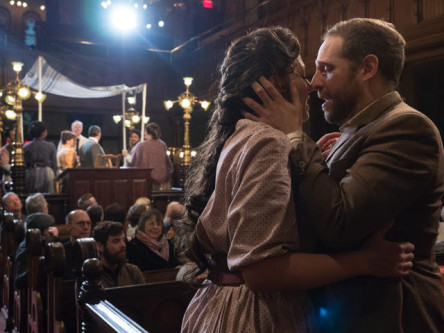 United States Gordon, Morning Star: American Modern Ensemble / Geoffrey McDonald (conductor), On Site Opera, The Museum at Eldridge Street, New York, 25.3.2018. (RP)
United States Gordon, Morning Star: American Modern Ensemble / Geoffrey McDonald (conductor), On Site Opera, The Museum at Eldridge Street, New York, 25.3.2018. (RP)

Cast:
Becky Felderman – Emily Pulley
Fanny Felderman – Jennifer Zetlan
Esther Felderman – Cree Carrico
Sadie Felderman – Blythe Gaissert
Aaron Greenspan – Joshua Jeremiah
Irving Tashman – Blake Friedman
Harry Engel – Andrew Lovato
Mary – Chrystal E. Williams
Prince – Martin Bakari
Rabbi Engel – David Langan
Kathleen O’Fallin – Allison Gish
Production:
Director – Eric Einhorn
Costume Designer – Summer Lee Jack
Lighting Designer – Shawn K. Kaufman
Prop Designer – Sydney E. Schatz
The 1911 Triangle Shirtwaist Factory fire resulted in the deaths of 146 workers, mostly Jewish and Italian immigrants or their children. The majority of the victims were women in their teens and twenties. (9/11 superseded it as New York City’s worst workplace disaster.) Ricky Ian Gordon, the composer of Morning Star, is a native New Yorker for whom the disaster was family history. His grandmother, Rebecca Lieberman, worked at the factory but was home sick on the day of the fire.
William H. Hoffman’s libretto for Morning Star is based on the 1940 Broadway play of the same name by Sylvia Regan. The plot centers on the widowed Becky Felderman (the magnificent, glowing soprano Emily Pulley), who had emigrated from Latvia with her late husband and three daughters to escape the pogroms. With the tragedy as its backdrop, Morning Star begins with the mourner’s Kaddish, the Jewish prayer to the dead, but it is in fact a hymn to life.
The story is a Lower East Side take on Louisa May Alcott’s Little Women, with three bright and ambitious young girls who dream of love and marriage but want to maintain their identities and independence. The middle daughter, Esther (the delightful soprano Cree Carrico), who is head over heels in love with Harry Engel (the exceptionally fine baritone Andrew Lovato), her mother’s American history tutor, perishes in the fire.
The second act takes place in 1931 on the anniversary of the disaster. The marriages of Becky’s two surviving daughters are crumbling. The eldest, Sadie (portrayed by the powerhouse mezzo-soprano Blythe Gaissert), married her late sister’s beau and has become a relentless, driven career woman. Harry is in love with the memory of Esther, but he married Sadie for children, a luxury that she cannot afford. Trips to the Russian Lady solve that problem, but eat away at her soul.
The youngest daughter, Fanny (soprano Jennifer Zetlan melted hearts singing dreamily of the Morning Star), abandoned her dreams of becoming a singer for marriage and children, but she has had enough of her husband’s philandering and is flying to Reno for a divorce. Becky not only manages to hold her daughters close to her, but finds happiness with Aaron Greenspan (affably portrayed by rich-voiced baritone Joshua Jeremiah), her long-frustrated admirer who knew her as a girl in Riga.
No set was possible, nor needed, in the restored Moorish Revival synagogue, with its 70-foot-high dome, barrel-vaulted ceiling, magnificent stained-glass windows, elaborate brass fixtures and hand-stenciled walls. The drama took up the entire space, even the balconies: family conflicts played out front and center, love duets soared from above and, in an Act 2 flashback, screaming men and women leaped to escape the flames. It’s a lot to pack into an opera, perhaps too much, but Eric Einhorn kept the action flowing seamlessly.
Fanny and Irving Tashman (tenor Blake Friedman who not only could croon but sang with ringing tone) are married under the chuppah on the imposing bema that dominates the center of the sanctuary. Two pine coffins topped with Stars of David served double duty as a table and a hutch. After they were carried out, the cast filled the aisles with lit yahrzeit (memorial) candles. How could you not help but have a lump in your throat?
Since no money was needed for sets, there was a budget for well-crafted costumes. (Sadie’s second act red and white ensemble was particularly attractive.) On Site Opera spent its money wisely, as the singers were often just inches away from the audience; neither a weak link in the cast nor shoddy garb would have gone unnoticed.
If the former synagogue was the perfect place to experience Morning Star, it was not ideal acoustically. Perhaps little could have been done about that, given a 16-piece orchestra conducted by Geoffrey McDonald in a confined space. Few details of Bruce Coughlin’s new orchestration of the opera for chamber ensemble could be heard as the sound literally ricocheted off the walls. However, in no way would I have sacrificed the intensity and authenticity for balance.
25 March 2018 was 107 years to the day of the Triangle Shirtwaist Factory fire. The building would still have been smoldering and the dead heaped on the ground at the hour when bass-baritone David Langan, as Rabbi Engel, began to sing Kaddish, but it is a passage from Ecclesiastes that I thought of as I left the synagogue: ‘And some there be, which have no memorial; who are perished, as though they had never been; and are become as though they had never been born; and their children after them’.
The victims of the Triangle Shirtwaist fire may not have their names listed on a memorial (yet), but they have not been forgotten and Morning Star is their memorial.
Rick Perdian
